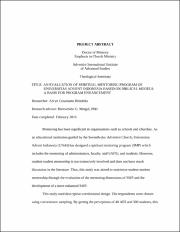| dc.description.abstract | Mentoring has been significant in organizations such as schools and churches. As an educational institution guided by the Seventh-day Adventist Church, Universitas Advent Indonesia (UNAI) has designed a spiritual mentoring program (SMP) which includes the mentoring of administrators, faculty, staff (AFS), and students. However, student-student mentorship is not extensively involved and does not have much discussion in the literature. Thus, this study was aimed to maximize student-student mentorship through the evaluation of the mentoring dimensions of SMP and the development of a more enhanced SMP.
This study used descriptive-correlational design. The respondents were chosen using convenience sampling. By getting the perceptions of 40 AFS and 300 students, this
study determined (a) the status of the spiritual mentoring practice; (b) effectiveness of the mentoring dimensions; (c) significant correlation between mentoring practice and effectiveness; (d) significant difference in the respondents’ perceptions on the effectiveness of mentoring dimensions; (e) significant difference in the respondents’ perceptions on the status of mentoring practice; (f) biblical concept of mentoring based on the model of the apostle Paul and Timothy; and (g) the proposed SMP. Using descriptive statistics, AFS perceived that establishing and molding relationships, engendering information background, networking of responsibility through contracts, teaching and equipping, open modeling, repertoire harnessing, giving feedback, evaluating, and generating commitment and rewarding were being practiced. The students perceived them as being practiced except for establishing and molding relationships (M = 2.95, SD = 0.868) which was perceived to be moderately practiced only. This indicates that this dimension should be given more attention.
In terms of effectiveness, AFS and students believed that the mentoring dimensions were effective except for open modeling (M = 4.07, SD = 0.579) which was perceived as highly effective by AFS. Using Pearson correlation, there is a statistically significant strong positive relationship (r = 0.662, p < 0.01) between mentoring practice and effectiveness. There is also a statistically significant difference between AFS and students on the effectiveness and status of mentoring practice at UNAI.
Paul and Timothy displayed a model of mentoring relationship that later became a reproductive mentoring. The principles and theories considered in the review of biblical and theoretical foundation of mentoring were used to identify the 9 mentoring dimensions evaluated in the program. The result of the evaluation became the basis for the
development of a more enhanced SMP for UNAI to have a much more meaningful experience in mentoring. More principles for SMP have also been designed to guide its implementation. More importantly, it is hoped that through the new SMP, AFS-student mentorship can be more effective while the student-student mentorship is maximized to make them widely involved. Thus, more mentees can be reached out and more souls can be brought to Jesus’s feet. | en_US |

